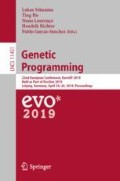Abstract
The genotype-to-phenotype mapping plays an essential role in the design of an evolutionary algorithm. Since variation occurs at the genotypic level but fitness is evaluated at the phenotypic level, this mapping determines how variations are effectively translated into quality improvements. We numerically study the redundant genotype-to-phenotype mapping of a simple Boolean linear genetic programming system. In particular, we investigate the resulting phenotypic network using tools of complex network analysis. The analysis yields a number of interesting statistics of this network, considered both as a directed as well as an undirected graph. We show by numerical simulation that less redundant phenotypes are more difficult to find as targets of a search than others that have much more genotypic abundance. We connect this observation with the fact that hard to find phenotypes tend to belong to small and almost isolated clusters in the phenotypic network.
Access this chapter
Tax calculation will be finalised at checkout
Purchases are for personal use only
References
Kell, D.B.: Genotype-phenotype mapping: genes as computer programs. Trends Genet. 18(11), 555–559 (2002)
de Visser, J.A.G.M., Krug, J.: Empirical fitness landscapes and the predictability of evolution. Nat. Rev. Genet. 15, 480–490 (2014)
Schaper, S., Louis, A.A.: The arrival of the frequent: how bias in genotype-phenotype maps can steer populations to local optima. PLoS One 9(2), e86635 (2014)
Catalan, P., Wagner, A., Manrubia, S., Cuesta, J.A.: Adding levels of complexity enhances robustness and evolvability in a multilevel genotype-phenotype map. J. R. Soc. Interface 15(138), 20170516 (2018)
Banzhaf, W.: Genotype-phenotype-mapping and neutral variation—a case study in Genetic Programming. In: Davidor, Y., Schwefel, H.-P., Männer, R. (eds.) PPSN 1994. LNCS, vol. 866, pp. 322–332. Springer, Heidelberg (1994). https://doi.org/10.1007/3-540-58484-6_276
Smith, T., Husbands, P., O’Shea, M.: Neutral networks and evolvability with complex genotype-phenotype mapping. In: Kelemen, J., Sosík, P. (eds.) ECAL 2001. LNCS (LNAI), vol. 2159, pp. 272–281. Springer, Heidelberg (2001). https://doi.org/10.1007/3-540-44811-X_29
Rothlauf, F., Goldberg, D.E.: Redundant representations in evolutionary computation. Evol. Comput. 11(4), 381–415 (2003)
Hu, T., Banzhaf, W., Moore, J.H.: The effect of recombination on phenotypic exploration and robustness in evolution. Artif. Life 20(4), 457–470 (2014)
Hu, T., Payne, J., Banzhaf, W., Moore, J.H.: Evolutionary dynamics on multiple scales: a quantitative analysis of the interplay between genotype, phenotype, and fitness in linear genetic programming. Genet. Program. Evolvable Mach. 13(3), 305–337 (2012)
Newman, M.E.J., Engelhardt, R.: Effects of selective neutrality on the evolution of molecular species. Proc. R. Soc. B 265(1403), 1333–1338 (1998)
Wagner, A.: Robustness, evolvability, and neutrality. Fed. Eur. Biochem. Soc. Lett. 579(8), 1772–1778 (2005)
van Nimwegen, E., Crutchfield, J.P., Huynen, M.A.: Neutral evolution of mutational robustness. Proc. Natl. Acad. Sci. 96(17), 9716–9720 (1999)
Galvan-Lopez, E., Poli, R.: An empirical investigation of how and why neutrality affects evolutionary search. In: Cattolico, M. (ed.) Proceedings of the Genetic and Evolutionary Computation Conference, pp. 1149–1156 (2006)
Hu, T., Banzhaf, W.: Neutrality and variability: two sides of evolvability in linear genetic programming. In: Proceedings of the 18th Genetic and Evolutionary Computation Conference (GECCO), pp. 963–970 (2009)
Hu, T., Banzhaf, W.: Neutrality, robustness, and evolvability in genetic programming. In: Riolo, R., Worzel, B., Goldman, B., Tozier, B. (eds.) Genetic Programming Theory and Practice XIV. GEC, pp. 101–117. Springer, Cham (2018). https://doi.org/10.1007/978-3-319-97088-2_7
Nickerson, K.L., Chen, Y., Wang, F., Hu, T.: Measuring evolvability and accessibility using the Hyperlink-Induced Topic Search algorithm. In: Proceedings of the 27th Genetic and Evolutionary Computation Conference (GECCO), pp. 1175–1182 (2018)
Brameier, M.F., Banzhaf, W.: Linear Genetic Programming. Springer, Boston (2007). https://doi.org/10.1007/978-0-387-31030-5
Barábasi, A.L.: Network Science. Cambridge University Press, Cambridge (2016)
Barrat, A., Barthélemy, M., Vespignani, A.: Dynamical Processes on Complex Networks. Cambridge University Press, Cambridge (2008)
Hu, T., Payne, J.L., Banzhaf, W., Moore, J.H.: Robustness, evolvability, and accessibility in linear genetic programming. In: Silva, S., Foster, J.A., Nicolau, M., Machado, P., Giacobini, M. (eds.) EuroGP 2011. LNCS, vol. 6621, pp. 13–24. Springer, Heidelberg (2011). https://doi.org/10.1007/978-3-642-20407-4_2
Hu, T., Banzhaf, W.: Quantitative analysis of evolvability using vertex centralities in phenotype network. In: Proceedings of the 25th Genetic and Evolutionary Computation Conference (GECCO), pp. 733–740 (2016)
Csardi, G., Nepusz, T.: The igraph software package for complex network research. InterJournal Complex Syst. 1695, 1–9 (2006). http://igraph.org
Newman, M.E.J., Girvan, M.: Finding and evaluating community structure in networks. Phys. Rev. E 69, 026113 (2004)
Masuda, N., Porter, M.A., Lambiotte, R.: Random walk and diffusion in networks. Phys. Rep. 716, 1–58 (2017)
Acknowledgements
This research was supported by the Natural Sciences and Engineering Research Council (NSERC) of Canada Discovery Grant RGPIN-2016-04699 to T.H., and the Koza Endowment fund provided to W.B. by Michigan State University.
Author information
Authors and Affiliations
Corresponding author
Editor information
Editors and Affiliations
Rights and permissions
Copyright information
© 2019 Springer Nature Switzerland AG
About this paper
Cite this paper
Hu, T., Tomassini, M., Banzhaf, W. (2019). Complex Network Analysis of a Genetic Programming Phenotype Network. In: Sekanina, L., Hu, T., Lourenço, N., Richter, H., García-Sánchez, P. (eds) Genetic Programming. EuroGP 2019. Lecture Notes in Computer Science(), vol 11451. Springer, Cham. https://doi.org/10.1007/978-3-030-16670-0_4
Download citation
DOI: https://doi.org/10.1007/978-3-030-16670-0_4
Published:
Publisher Name: Springer, Cham
Print ISBN: 978-3-030-16669-4
Online ISBN: 978-3-030-16670-0
eBook Packages: Computer ScienceComputer Science (R0)

